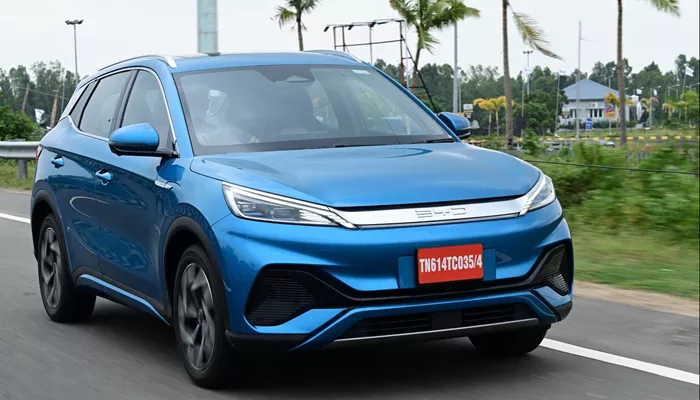BYD’s UK chief has rejected claims that the Chinese car manufacturer is “dumping” vehicles in the UK, asserting instead that the company is offering advanced technology to drivers.
BYD, a leading Chinese electric vehicle (EV) manufacturer, has quickly become one of the most talked-about brands in the UK and is the world’s top-selling EV maker, surpassing Tesla. In the first quarter of this year, BYD sold 9,271 vehicles, surpassing its total sales from 2024. The brand now holds 1.6% of the UK market share, a significant rise from just 0.23% at the same time last year.
Bono Ge, Country Manager for BYD UK, shared insights into the company’s growth during an interview with Fully Charged founder Robert Llewellyn at the Everything Electric London event. Ge, who played a key role in launching BYD’s electric bus fleet in London, highlighted that the brand now provides 75% of London’s electric buses, contributing to a reduction in transport emissions. As a result, transport is no longer the leading source of pollution in the city, with central heating now identified as the primary contributor.
BYD offers five models in the UK, including four electric cars—Sealion 7, Atto 3, Dolphin, and Seal—as well as the Seal U DM-i hybrid. The company’s Atto 2 is set to launch later this year. Ge noted that BYD continues to provide hybrid cars as an option for drivers who are not yet ready to fully embrace electric vehicles but want to transition away from petrol and diesel.
There have been accusations that some Chinese car manufacturers are using tariffs and trade laws to “dump” cars in the UK and Europe. This practice involves selling vehicles at significantly lower prices than local competitors. Some critics have suggested that BYD, along with other Chinese brands, is selling cheap EVs in these markets, undercutting established manufacturers. However, Ge firmly dismissed these claims.
“We’re not dumping here,” Ge stated. “We’re offering better technology. Would we consider Apple dumping iPhones in the market?”
He emphasized that consumers adapt to market changes, drawing a comparison to the mobile phone industry. Ge noted that 20 years ago, people favored Nokia phones because they were reliable and affordable, but now, many opt for Apple’s iPhones because of their advanced technology. BYD is offering more in-car technology at an accessible price, which, Ge suggested, will encourage drivers to switch to EVs.
Ge also pointed out that most people looking to buy a smartphone can afford an iPhone, and similarly, many potential car buyers can afford a BYD EV, especially when compared to larger, more established brands.
To address charging concerns, BYD is introducing a “flash charging” feature designed to reduce charging time, making it as fast as filling up a petrol or diesel car. The Super e-Platform, which provides charging at a rate of one megawatt (1,000 kW), allows drivers to charge their vehicles at a speed of two kilometres per second, adding 400 kilometres of range in just five minutes. BYD has already installed 400 of these ultra-fast chargers in China, and they will be compatible with the upcoming BYD Han L and Tang L models.
When asked about expanding this technology internationally, Ge said BYD would need to assess whether it makes sense to introduce it to the UK. He acknowledged the growing demand for electric vehicles in the UK and welcomed the increase in charging stations. However, Ge expressed concerns about the cost of rapid and ultra-rapid public charging, which can reach around 77p per kilowatt-hour.


